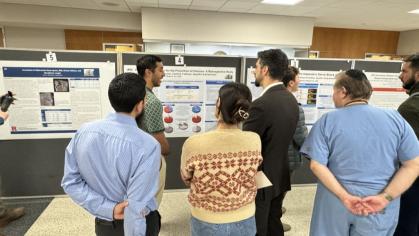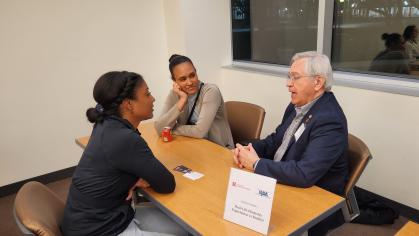Speaker Helps Destigmatize Mental Illness Among Students
At 18, Jordan Burnham became known as the kid who survived a fall from a nine-story building.
Few people live through a plummet from that height, about 100 feet, and although Burnham suffered severe injuries, he succeeded in completing a long and painful recovery.
Burnham's leap from the window was a suicide attempt. Two years before the fall, he had been diagnosed with depression and, later, bipolar disorder. But he sought to escape mental illness rather than acknowledge it and learn to cope.
“I didn’t handle it well,” he admitted. “I didn’t accept it. I didn’t talk about it. I went to see a therapist but I just said all the right things so I could get out of there.’’
Today, at age 25, Burnham travels to schools and colleges, raising awareness about mental health among students and sharing information on the best ways to spot signs of depression, anxiety or mental disorders in themselves or loved ones.
For the past five years or so, he has been an orientation-week speaker at RSDM, where he discusses triggers that can lead to feelings of depression and anxiety. Burnham, from Upper Merion, is a representative of Active Minds, an organization that works to destigmatize mental illness among students.
Rather than focusing on the obvious checklist of symptoms –- loss of appetite, trouble sleeping, substance abuse – he shares anecdotes that resonate with his audience. He mentions the football player friend who sang Hannah Montana songs when he was drunk because he was too ashamed to sing them while sober, and classmates who relied on alcohol to give them courage to dance without embarrassment. "Of course, they only danced worse when they were drunk,'' he jokes.
“A lot of people just accept college students getting drunk because they think that’s what they’re supposed to do,’’ says Burnham. “But the main reason they drink is anxiety, especially social anxiety. My goal is to make people question why they are drinking to excess. What are you trying to mask?’’
During his talk at RSDM, Burnham gave tips on how to approach a friend or loved one about the possibility that they might be depressed and how to tell the difference between “being depressed” and “depression.’’
“When you’re depressed, you know why , you’re sad because of a break-up or some other event,’’ he said. “When you don’t know why, and it continues, it could be depression.’’
Approaching someone who shows signs of depression or other mental illness can be difficult, but if you can reach out to them without overinvolvement (texting every two mintues to ask if they’re ok) or minimizing their feelings (immediately saying, “You’ll get over it. You’ll be fine.’’) you can provide support.
“Sometimes, it’s good to ask “how are you feeling,’’ rather than just “how are you,’’ Burnham suggested.
“Offer to be an active listener. You can tell them ‘I’m here if you want to vent,’ listen without giving advice,’’ he said.
Burnham said one way to deal with stress and anxiety is to recognize that there are many different ways to succeed beyond top grades or a perfect performance. “Medical students and dental students can face a lot of pressure. But there are many blueprints to success.’’
Most of all, he said, allow yourself a break throughout the day, he tells students. “Make sure you take ten minutes outside of an hour to do something that requires no brain cells. Do something that makes you happy. When you’re overwhelmed write down five things you can accomplish within the next 24 or 48 hours. When you break it down that way, sometimes you realize that there aren’t so many things, or they’re not as overwhelming as you thought.’’




